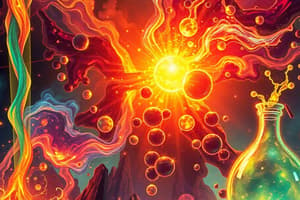Podcast
Questions and Answers
In a synthesis reaction, what typically happens to the atoms involved?
In a synthesis reaction, what typically happens to the atoms involved?
- Atoms combine to form covalent bonds (correct)
- Atoms break apart and form simpler substances
- Atoms form ionic bonds
- Atoms undergo a single replacement
Which type of reaction results in the breakdown of a single compound into simpler substances?
Which type of reaction results in the breakdown of a single compound into simpler substances?
- Synthesis
- Double replacement
- Decomposition (correct)
- Single replacement
What characterizes a double replacement reaction in terms of the compounds involved?
What characterizes a double replacement reaction in terms of the compounds involved?
- Elements combine to form covalent bonds
- Elements break apart into simpler substances
- An element replaces another element in a compound
- Cations and anions switch places (correct)
Which type of reaction involves an element replacing another element in a compound?
Which type of reaction involves an element replacing another element in a compound?
What distinguishes a decomposition reaction that is endothermic?
What distinguishes a decomposition reaction that is endothermic?
In a redox reaction, which process occurs?
In a redox reaction, which process occurs?
What characterizes an acid-base reaction?
What characterizes an acid-base reaction?
Which type of reaction involves the rapid oxidation of a substance?
Which type of reaction involves the rapid oxidation of a substance?
What is a common outcome of combustion reactions?
What is a common outcome of combustion reactions?
Why is understanding the types of chemical reactions important?
Why is understanding the types of chemical reactions important?
Study Notes
Understanding Types of Chemical Reactions
Chemical reactions are transformations where substances, known as reactants, combine or break apart to form new substances called products. These conversions are described using chemical equations, which adhere to the law of conservation of mass by preserving the total number of atoms before and after the reaction.
Several types of chemical reactions are classified according to their reactants and the products they form.
Synthesis
Reactants combine to form products in a synthesis reaction, also called a composition reaction. This type of reaction typically involves the formation of a new covalent bond between the atoms.
Decomposition
A decomposition reaction is the opposite of synthesis, as a single compound breaks down into two or more simpler substances. This type of reaction is endothermic if heat is absorbed from the surroundings.
Single replacement (Displacement)
In a single replacement reaction, an element replaces another element in a compound, forming a new compound as well as a new element in its elemental form. The element being replaced is generally more reactive, and it is often a metal. This type of reaction is also called a displacement reaction.
Double replacement (Metathesis)
In a double replacement reaction, the cations and anions of two compounds switch places, forming two new compounds. This type of reaction is also known as a metathesis reaction.
Redox (Reduction and Oxidation)
Redox reactions involve the transfer of electrons between substances. They are classified according to the atoms that gain or lose electrons, resulting in reduction and oxidation, respectively.
Acid-base reactions
Acid-base reactions occur when acids and bases interact, with the acid donating a proton (H⁺) to the base, resulting in the formation of water and a conjugate acid-base pair.
Combustion
Combustion reactions involve the rapid oxidation of a substance, usually a fuel (such as methane or glucose), in the presence of oxygen gas. This type of reaction is an exothermic process, releasing energy in the form of heat and light.
Chemical reactions are fundamental to our daily lives and the world around us, from cooking food to the formation of the Earth's atmosphere. Understanding the types of chemical reactions is essential for predicting and controlling the outcomes of chemical processes in various fields, including chemistry, biology, and technology.
Studying That Suits You
Use AI to generate personalized quizzes and flashcards to suit your learning preferences.
Description
Test your knowledge on different types of chemical reactions, including synthesis, decomposition, single replacement, double replacement, redox, acid-base reactions, and combustion. These reactions play a crucial role in various fields like chemistry, biology, and technology.




